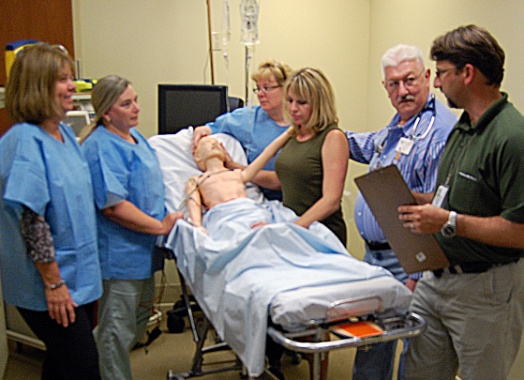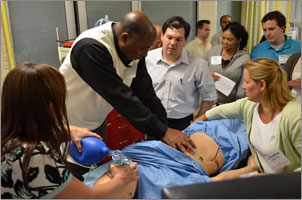iSIM Course: Improving Instructional Methods for Simulation Educators
Are you looking for training in medical simulation instructional methods? Project Manager Richard Rodríguez-Pérez from The Michael S. Gordon Center for Research in Medical Education wrote in to let me know about the iSim Course.
This 2.5 day program is a collaborative effort of the Gordon Center for Research in Medical Education (GCRME) at the University of Miami and the Peter M. Winter Institute for Simulation, Education and Research (WISER) at the University of Pittsburgh. It is designed as an introduction to fundamental skills and abilities for delivering simulation-based healthcare education through a variety of techniques and technologies. The program emphasizes hands-on activities and active participation to maximize simulation-based instruction skill acquisition. The program is open to all medical professionals who are interested in improving their simulation-based instructional skills and is targeted at those with a background in healthcare education.
At the conclusion of the course, participants will be able to:
Sponsored Content:
- Review and discuss methods of simulation, simulation technologies and simulation environments.
- Identify and incorporate evidence-based features that lead to effective simulation-based learning.
- Review basic design and development elements for constructing a simulation scenario activity.
- Identify simulation environment design requirements elements as they relate to required fidelity and equipment for simulation activities.
- Identify the elements necessary to use simulation for assessment and debriefing.
- Review debriefing methods for team training simulation activities.
- Implement fundamental strategies for debriefing healthcare teams
While covering the WISER Nursing Simulation Symposium last month I had a chance to sit down with one of the Directors of the iSim Course, Dr. Paul Phrampus – where he shared about the powerful training program during our video interview:
To learn more about this course and how to register, continue reading this article by clicking the link below.
Sponsored Content:
Video Interview Transcript:
Paul: “Part of our mission at WISER is to provide outreach to other entities, resources, and people to improve their efforts in simulation. Not only to lower some of their barriers with the methodology but also to help identify the barriers that exist around the world. I’ve been fortunate to travel extensively and visit many other simulation centers. From these experiences it was recognized that there’s a deficit in facilitator and educator training as simulation becomes more and more prevalent. It quickly becomes apparent there are unique skills and unique knowledges and core principles that one needs to be a successful simulation educator.
It is not just ‘walk out of the teaching clinic and walk into the simulation lab’ and be a star educator — there are many many nuances to it. Some time ago I was participating in a world wide multi-center participation research group at the University of Miami with the Gordon Center For Research and Medical Education (GCRME). A partnership was established between Doctor Barry Issenberg, Doctor Gordon and myself when we realized that many of the philosophies of the GCRME were directly compatible with what we had developed here at WISER and the University of Pittsburgh. We identified the need for better faculty development training and that led to the birth of the iSIM program.
iSIM stands for ‘Improving Simulation Instructional Methods’ and it’s a series of programs designed to provide “train the trainer” functionality to everybody from the people who are just getting involved in simulation for the first time through advanced practitioners of simulation looking for topics such as research and the nuances of its assessment. The main program that people associate with iSIM is the one that is simply called iSIM. That is the faculty development training program that is the entry point of most novices or people with a little experience in simulation that want to develop core foundations to demonstrate a commitment and a pathway to simulation based education. I
t’s a three day program that is experiential learning. There are materials to review ahead of time and there are some didactics, but the amount of lectures done during the program is sparing. There is an extensive amount of small ground work that lead people through the process of simulation at the scenario level. Its the thought process of identify the learner groups and pay a lot of attention to the objectives.
One of the things that we found is that if we can get new instructors and new faculty members focused on developing measurable and specific learning objectives it helps them build more effective learning scenarios. Throughout the three day course each small group will develop three simulation scenarios and have the opportunity to beta test them or run them on a group of students who where not involved in the design process.
After that is done we conduct a meta debriefing to sort of debrief this scenario construct process and look how it mapped back to the learning objectives, look at where the successes were and look at the opportunities to refine and make things better. And so experientially people learn this through three days and three cycles that are complimented with small layers of didactic information that help educators focus on the areas that they are concentrating on, to build those simulations.
We focus one day usually with computerized simulators or high technology simulators and an emphasis on debriefing. We focus the next day on the implementation or selection of standardized patients partial task trainers combining them and creating hybrid simulations, as well as introductory concepts in assessment. That helps people to understand that when you build a simulation scenario you want to be able to asses the scenario for successfulness and you also want to be able to asses the students for successfulness as well.
The last day focuses on the team training, and we emphasis the differences between simulation scenarios that are created for a small group of students versus those simulations that are designed to look at the elements of team training and team leadership and so on. iSim has been a very successful program that has run several hundred times. We run it routinely at the University of Pittsburgh and The University of Miami and once a year at the University of Honolulu in Hawaii – which many people like! We have done an extensive number of iSIM programs on site at hospital programs throughout the US and extensively in Asia, and we just had our inaugural program in Australia approximately recently at the end of May.”
Click here to watch more video interviews with Dr. Paul Phrampus, Director of the WISER Center and President of the Society for Simulation in Healthcare.
iSim Directors:
- Barry Issenberg, MD University of Miami
- Paul Phrampus, MD University of Pittsburgh
- Jeff Groom, PhD, CRNA Florida International University
- John O’Donnell, CRNA, MSN, DrPH University of Pittsburgh
- Ross J. Scalese, MD University of Miami
The program is a collaborative effort of the Gordon Center for Research in Medical Education (GCRME) at the University of Miami and the Peter M. Winter Institute for Simulation, Education and Research (WISER) at the University of Pittsburgh. It is designed as an introduction to fundamental skills and abilities for delivering simulation-based healthcare education through a variety of techniques and technologies. The program emphasizes guided hands-on learning through active participation to maximize simulation-based instruction skill acquisition. It is open to all healthcare professionals who want to improve their simulation-based instructional skills, and is targeted at those with an interest in training and assessment.
If you decide to attend please be sure to tell them that HealthySimulation.com sent you!
Lance Baily, BA, EMT-B, is the Founder / CEO of HealthySimulation.com, which he started in 2010 while serving as the Director of the Nevada System of Higher Education’s Clinical Simulation Center of Las Vegas. Lance also founded SimGHOSTS.org, the world’s only non-profit organization dedicated to supporting professionals operating healthcare simulation technologies. His co-edited Book: “Comprehensive Healthcare Simulation: Operations, Technology, and Innovative Practice” is cited as a key source for professional certification in the industry. Lance’s background also includes serving as a Simulation Technology Specialist for the LA Community College District, EMS fire fighting, Hollywood movie production, rescue diving, and global travel. He and his wife live with their two brilliant daughters and one crazy dachshund in Las Vegas, Nevada.
Sponsored Content:


















